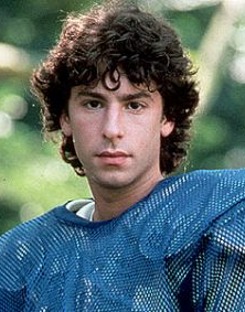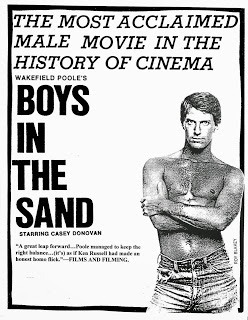|
presents THIS DAY IN GAY HISTORY based on: The White Crane Institute's 'Gay Wisdom', Gay Birthdays, Gay For Today, Famous GLBT, glbt-Gay Encylopedia, Today in Gay History, Wikipedia, and more …
Collected by Ted December 29 [{(o)}]|[{(o)}]|[{(o)}]|[{(o)}]| [{(o)}]|[{(o)}] 570 B.C. – Polycrates, the Greek tyrant, was born on this date (d.522). By pirate raids and indiscriminate warfare, the tyrant of Samos dominated the East Aegean. He waged various wars and was, until the end of his life, victorious. His ruthlessness drove the philosopher Pythagorus from Samos, where Polycrates was generally despised. Eventually he was lured to Magnesia by one of his enemies, where he was crucified. But even meanies can lose their hearts to the right guy, and Polycrates, tyrant though he was, was still a normal Greek. His special friend was Bathyllus, so beautiful that Polycrates dared to erect a statue in his honor in the temple of Hera, goddess of women. Polycrates may have thought it appropriate that beautiful Bathyllus have his place among women, but it was considered an act of arrogance nonetheless. Almost immediately thereafter he was crucified.
1804 – Ohio repeals the 1795 common-law reception statute, making sodomy legal in the state.
1879 – Died: Charley Parkhurst, born Charlotte Parkhurst (b.1812), also known as One-Eyed Charley or Six-Horse Charley, who was an American stagecoach driver, farmer and rancher in California. Born and reared as a girl in New England, mostly in an orphanage, Parkhurst ran away as a youth, taking the name Charley and living as a male. He started work as a stable hand and learned to handle horses, including to drive coaches drawn by multiple horses. He worked in Massachusetts and Rhode Island, traveling to Georgia for associated work. In his late 30s, Parkhurst sailed to California following the Gold Rush in 1849; there he became a noted stagecoach driver. In 1868 he may have been the first female (though passing as a man) to vote in a presidential election in California. At his death, it was discovered that his gender assigned at birth was female. After Parkhurst died in 1879, neighbors came to the cabin to lay out the body for burial and discovered that his body appeared to be female to them. Rheumatism and cancer of the tongue were listed as causes of death. In addition, the examining doctor established that Parkhurst had given birth at some time. A trunk in the house contained a baby's dress. "The discovery of her true gender became a local sensation." and was soon carried by national newspapers. The fire station in Soquel, California, has a plaque reading:
"The first ballot by a woman in an American presidential election was cast on this site November 3, 1868, by Charlotte (Charlie) Parkhurst who masqueraded as a man for much of her life. She was a stagecoach driver in the mother lode country during the gold rush days and shot and killed at least one bandit. In her later years she drove a stagecoach in this area. She died in 1879. Not until then was she found to be a woman. She is buried in Watsonville at the pioneer cemetery."
Born in Hull, Yorkshire, England, Gidlow emigrated to French Canada with her family when she was a child. The eldest of seven children, she lived her young life in poverty. She was emotionally affected by witnessing her mother's harsh life and her strong commitment to her children, at least three of whom struggled with mental illnesses. In 1920, Gidlow moved to New York City, where she worked for Pearson's, a progressive magazine. In 1926, she relocated to the San Francisco Bay Area, where she later became active in the Daughters of Bilitis and where she cofounded the Society of Comparative Philosophy in 1962. Gidlow's life has been documented in her autobiography, Elsa, I Come With My Songs, published just a month before she died in 1986, and in Peter Adair's 1977 documentary, Word is Out: Stories of Some of Our Lives. From the 1920s through the 1950s, when homophile groups first began organizing, Gidlow was living openly as a lesbian. She documents in her autobiography how difficult it was to find other lesbians in the years before glbtq communities became visible; she also describes the passionate relationships—with friends as well as lovers—that she was able to cultivate even in those days. Gidlow spent thirteen years—from 1926 to 1938—partnered with one woman, Violet Winifred Leslie Henry-Anderson, aptly nicknamed "Tommy," until Tommy died of lung cancer. Gidlow later lived openly with Isabel Grenfell Quallo, a biracial woman. During the McCarthy era, soon after the end of World War II, Gidlow was accused of Communist sympathies and became the subject of an investigation. Her cohabiting in an interracial, lesbian relationship may have provoked the investigation as much as her politics. Indeed, when she was questioned by the House Un-American Activities Committee, she had nothing good to say about Communism, since her own political sympathies lay with the anarchists, who considered Marxism just another oppressive ideology. Gidlow was a social reformer, cultural critic, peace activist, and self-proclaimed anarchist. She participated, often in a leading role, in many San Francisco liberation movements: from the bohemian-beat generation of the 1950s, to the 1960s anti-war movement, to the early years of feminist and gay organizing. After suffering a series of strokes, Gidlow died on June 8, 1986. Her papers are now part of the archives of the Gay and Lesbian Historical Society of Northern California.
1914 – The American musician Billy Tipton was born on this date (d.1989). A jazz pianist and saxophonist Tipton was born in Oklahoma City, Oklahoma. She grew up in Kansas City, MO, where she was raised by an aunt after her parents' divorce. After the divorce, she rarely saw her father, G.W. Tipton, a pilot who sometimes took her for airplane rides. As a high school student, Tipton became interested in music, especially jazz. She went by the nickname "Tippy." In 1933, Tipton began dressing like a man, which allowed her to blend with the other members of the jazz bands she played with in small Oklahoma bars. As she began a more serious music career, she decided to adopt a male persona, calling herself by her father's nickname, Billy, and presenting herself consistently as male. She had a face which could easily pass as male, so she could bind her breasts and pad her pants to create a believable illusion of masculinity. The change to life as a man made it possible for Tipton to continue a career in jazz, where opportunities for women were more limited. At first, she was male only in her public persona, but by 1940 she was presenting herself as male both publicly and privately. Tipton gradually gained success and recognition as a musician. In 1936, he was the leader of a band playing on KFXR. In 1938, he joined Louvenie's Western Swingbillies, a band which played on KTOK and at Brown's Tavern. In 1940 Tipton was touring the Midwest playing at dances with Scott Cameron's band. In 1941 he began two and a half years playing at Joplin, MO's Cotton Club with George Mayer's band, then toured for a time with Ross Carlyle, then played for two years in Texas. Early in her career, Tipton cross-dressed only professionally, and still lived in her private life as a woman. She spent those early years living with a woman named Non Earl Harrell, in a relationship which other musicians recognized as Lesbian. The relationship ended in 1942. Tipton's next relationship, with a singer named June, lasted for several years. For seven years, Tipton lived with Betty Cox, who was 19 years old when they became involved. According to Betty, they had a "heterosexual" relationship which included sex. He kept the secret of his biological sex by telling Betty that he had been in a serious car accident which required him to bind his chest to protect broken ribs, and which had badly damaged his genitals. This is the story he would also tell subsequent women with whom he was involved. Betty was not faithful to Tipton, but was fond of him nonetheless, and remembered him as "the most fantastic love of my life." After Betty ended their relationship, he quickly became involved with Maryann Catanach, a prostitute. According to Maryann, theirs was a "normal" sexual relationship, and she did not know that Tipton was biologically female, since he dressed in private, had sex only in the dark, and preferred to touch, not to be touched. Two of Tipton's female cousins were the only persons privy to both sides of his life, and Tipton kept in contact with them for years. In 1960, he ended a relationship with the prostitute to be married to nightclub dancer and stripper Kitty Kelly (later Oakes), who was known professionally as "The Irish Venus". Tipton was never legally married, but several women had drivers' licenses identifying them as Mrs. Tipton. Kitty said that they never had sex, but had an otherwise normal life. They were involved with their local PTA and with the Boy Scouts. They adopted three sons, John, Scott, and William. Although Kitty denied having any knowledge that she was married to a transman, John and Scott did not believe her. William described Tipton as a good father who loved to go on Scout camping trips. Their adopted sons became difficult to manage during their adolescence. Because of the couple's ongoing arguments over how they should raise the boys, Tipton left Kitty, moved into a mobile home with their sons, and resumed his old relationship with Maryann. In 1989, at the age of 74, Tipton had symptoms he attributed to emphysema and refused to call a doctor. Actually he was suffering from a hemorrhaging peptic ulcer, which, untreated, was fatal. It was while paramedics were trying to save Tipton's life, with son William looking on, that William learned that his father was biologically female. Tipton was pronounced dead at Valley General Hospital. The coroner shared the revelation with the rest of the family. In an attempt to keep the secret, Kitty arranged for his body to be cremated, but one of their sons went public with the story. The first newspaper article was published the day after Tipton's funeral and it was quickly picked up by wire services. Stories about Tipton appeared in a variety of papers including tabloids such as National Enquirer and The Star, as well as more reputable papers such as New York Magazine and The Seattle Times. Tipton's family even made talk show appearances. Two wills were left by Tipton: one handwritten and not notarized which left everything to William Jr.; and the second, notarized, leaving everything to Jon Clark. A court upheld the first will, and William inherited almost everything, with John and Scott receiving one dollar each. In a later ruling, the three sons were awarded equal shares of Tipton's estate, which included the penis "packer" device and the binds used to conceal his breasts.
1944 – Gilbert Adair (d.2011) was a Scottish novelist, poet, film critic and journalist. He was critically most famous for the "fiendish" translation of Georges Perec's postmodern novel A Void, in which the letter e is not used, but was more widely known for the films adapted from his novels, including Love and Death on Long Island (1997) and The Dreamers (2003). Adair was born in Kilmarnock, but from 1968 to 1980 he lived in Paris. His early works of fiction included Alice Through the Needle's Eye (following Alice's Adventures in Wonderland and Through the Looking-Glass) and Peter Pan and the Only Children (following Peter and Wendy). He won the Author's Club First Novel Award in 1988 for his novel The Holy Innocents. From 1992 to 1996 he wrote the "Scrutiny" column for The Sunday Times. During 1998 and 1999 he was the chief film critic of The Independent on Sunday, where in 1999 he also wrote a year-long column called "The Guillotine". In 1995 he won the Scott Moncrieff Translation Prize for his book A Void, which is a translation of the French book La Disparition by Georges Perec. The original book contains no instances of the letter e; Adair translated it with the same limitation. The film Love and Death on Long Island (1997), a tale of homosexual obsession, directed by Richard Kwietniowski, was based on his 1990 novel of the same name. The film The Dreamers (2003) directed by Bernardo Bertolucci, with a script by Adair, was based on his book The Holy Innocents, which Adair revised and re-released under the same title as the film. Adair collaborated on the screenplays of several Raúl Ruiz films: The Territory (1981), Klimt (2006) and A Closed Book (2010). Adair himself was homosexual, though he rarely talked about the matter, not wishing to be labelled. "Obviously there are gay themes in a lot of my novels," he said in an interview, "but I really wouldn't be happy to be thought of as a 'Gay Writer' ... Being gay hasn't defined my life." At the end of his life, he lived in London. Adair died from a brain haemorrhage, 13 months after suffering a stroke which blinded him. He was writing a stage version of Love and Death on Long Island, which is being developed by producers New Gods and Heroes, at the time of his death.
1946 – Larry Bliss, is an American educator and former politician from the state of Maine. A Democrat, he served in the Maine House of Representatives (2000–2008) and the Maine Senate (2008–2011). He resigned as a senator on April 15, 2011 after accepting a position as an administrator in the California State University system and leaving the state of Maine. Educated at the University of California, where he earned both bachelor's and master's degrees, Bliss made his career as a middle school and high school teacher, before moving to university administration. He worked at California State University, Sacramento, and San Francisco State University before moving to Maine. He was formerly employed as the Director of Career Services and Professional Life Development at the University of Southern Maine. Bliss was first elected to the Maine House of Representatives in November 2000, winning 58% of the general election vote in South Portland's 24th district. Re-elected in 2002, his district was renumbered the 122nd in time for the 2004 election, when he secured re-election with 67% of the vote. He won by a similar margin in 2006. Bliss is openly gay and has three children. He and his partner have been together since 1995. He has long been involved with charitable and community organizations, including the AIDS Project, the Equity Institute of Maine, the South Portland Citizens for Justice, and the Maine Lesbian/Gay Political Alliance (now known as EqualityMaine). He also served as Treasurer of the Cumberland County Democratic Committee.
1950 – Jon Polito (d.2016) was an American actor and voice artist. In a film and television career spanning 35 years, he amassed over 220 credits. Notable television roles included Detective Steve Crosetti in the first two seasons of Homicide: Life on the Street and as Phil Bartoli on the first season of Crime Story. Polito was born in Philadelphia, Pennsylvania. He is known for working with the Coen Brothers, most notably in the major supporting role of Italian gangster Johnny Caspar in Miller's Crossing. Polito won an OBIE award in 1980 for his theater performances off Broadway and for his lifetime of work in film and television he received the Maverick Spirit Event Award at Cinequest Film Festival in 2005. When Homicide began pre-production, Polito was asked to audition, and was initially reluctant – he didn't want move to Baltimore for the series, because he had just relocated from New York to Los Angeles. The script he received featured a dialogue scene between two detectives, one Polish American and the other Irish-American. Polito decided that the part he wanted was that of the Irishman, but he was told that he could not read for it. After reading for the part of the Polish-American detective, Polito added a message on his audition tape, saying that if the producers wanted to call him back, he would only be interested if he could take the part of the Irish detective. Series co-creators Barry Levinson and Tom Fontana did call him back, and they rewrote the character as an Italian, and cast him in the role. The other character, the Polish-American detective, was also rewritten, becoming Det. Meldrick Lewis, played by African-American actor Clark Johnson. Polito was openly gay. He married fellow actor Darryl Armbruster on October 16, 2015, fifteen years after they first met. He died from multiple myeloma on September 1, 2016, at the City of Hope Hospital, where he was being treated. Polito was 65 years old.
1957 – Today's the birthday of the American screenwriter/playwright Paul Rudnick. His plays include I Hate Hamlet, Jeffrey, The Most Fabulous Story Ever Told and Valhalla. He also wrote for Premiere magazine under the pseudonym "Libby Gelman-Waxner". Rudnick grew up in Piscataway Township, New Jersey. He is Jewish and openly gay. Rudnick came into his own as a playwright with Jeffrey (1993), an ultimately life-affirming comedy about a gay man in New York City negotiating his need for love and commitment in the age of AIDS. A nearly universally lauded play, Jeffrey has been produced throughout the United States and abroad. The original off-Broadway production won an Obie Award, an Outer Critics Circle Award, and the John Gassner Award for Outstanding New American Play. Rudnick successfully adapted Jeffrey for the 1995 screen version directed by Christopher Ashley, starring Steven Weber, Sigourney Weaver, Patrick Stewart, and Nathan Lane. The gay romantic comedy became a great hit in the gay and lesbian community, but it failed to attract a large mainstream audience. Not so Rudnik's most famous film, In and Out (1997), about the accidental "outing" of a small-town schoolteacher by a former student on national television. Loosely inspired by Tom Hanks' acceptance speech at the 1994 Academy Awards in which he thanked a gay former teacher, the film has been lauded by critics and audiences alike. Directed by Frank Oz, produced by Scott Rudin, and starring Kevin Kline and Tom Selleck, In and Out is particularly interesting for its approach to homosexuality (often a serious "problem" in films) via the conventions of screwball comedy. Although the homophobes are properly skewered, the film is suffused with good humor and good feeling. Indeed, the film is less a satire than a comic vision of a more relaxed and accepting middle America in which gay people are free to be themselves. This film is undoubtedly Rudnick's most popular work to date. Proudly open about his homosexuality, Rudnick is one of the most interesting comic writers at work today. He uses sharp wit and gentle satire to comment on contemporary mores. Unlike many satirists, his work is generally more positive than negative.
Martin first became involved in LGBT issues following the 2016 Orlando nightclub shooting, stating, he was "disappointed that more Catholic leaders did not offer support to the LGBT community" in the aftermath of the shooting, and started a series of lectures on how the Church could better minister to LGBT Catholics, which led to his book, Building a Bridge (2017). While the book was hailed by several prelates, including Bishop Robert McElroy, Cardinals Kevin Farrell and Joseph Tobin, it received a backlash from conservative Catholics, who successfully lobbied for many of his lectures at Catholic venues to be cancelled. In a critique of the book, Cardinal Robert Sarah described Martin as "one of the most outspoken critics of the church’s message with regard to sexuality". In 2018, Cardinal Raymond Burke stated that Martin has "an 'open' and wrong position on homosexuality". However, journalist Frank Bruni noted that Father Martin did not "explicitly reject Church teaching" but rather questioned the language in the Catechism of the Catholic Church that describes homosexual acts as "intrinsically disordered". In a column, Martin explained that he has never challenged the Church's teaching on homosexuality and never will. However, some critics have pointed out that nowhere in his book has Martin affirmed the Church's magisterial teaching to be true. Princeton professor Robert George argued that Catholics should accept that Martin believes in the Church's teaching on homosexuality. In 2017, Archbishop Charles Chaput of Philadelphia described many of the attacks against Father Martin as "bitterness" that is "unjust and unwarranted," but called for "serious, legitimate criticism" of the book's "perceived ambiguities" and inadequacies. Chaput argued that dealing with the substantive issues frankly "is the only way an honest discussion can be had." In 2019 Chaput again criticized the "bitter personal attacks" that have been made against Martin, calling them "inexcusable and unChristian." While stating that many of Martin's efforts to accompany and support people with same-sex attraction have been laudable, Chaput also criticized Martin for "a pattern of ambiguity in his teachings," which Chaput said undermined Martin's stated aims and alienated people from the "support they need for authentic human flourishing." Chaput stated: "The suggestion that the wisdom of the Church, rooted in the Word of God and centuries of human experience, is somehow cruel or misguided does grave harm to her mission." Martin replied that same-sex relations and same-sex marriage "are both impermissible (and immoral) under church teaching," and that the reason he doesn't focus on this "is that LGBT Catholics have heard this repeatedly." Bishop Thomas Paprocki and Bishop Richard Sticka supported Chaput's column. Bishop Paprocki described Father Martin's attitude as "deeply scandalous in the sense of leading people to believe that wrongful behavior is not sinful."
Martin lived in New York and San Francisco before moving to Canada in 1986. He took Canadian citizenship in 1989, living in Vancouver, Toronto, and Calgary. He published the first Doc and Raider strips in a Vancouver gay publication in 1987. Although the issue featuring Doc and Raider turned out to be the final issue of the publication, the strip was quickly picked up by other LGBT publications, including the Xtra! newspapers in Canada. The arrangement was a unique one in that Martin's fee for providing the panel was instead turned over to local charities and organizations, not necessarily LGBT ones; in its time, Doc and Raider underwrote everything from AIDS hospices in New Zealand to an arts festival in Scotland, resulting in total donations of close to a quarter million dollars (US). The characters have also been used to promote safer-sex practices and AIDS education, as well as rodeos, country dance conventions, and film festivals around the world. Martin published two books of the comic: Doc and Raider: Caught on Tape in 1994 and Doc and Raider: Incredibly Lifelike in 1996. A third, to be presented as an eBook, is currently in the works. He has also written a manual for theatre designers, "Big Show Tiny Budget", based on his years as a scenic and costume designer, and a novella, "Triptych". Martin retired the regular strip in 1997, although he drew two special five-page stories for the Little Sister's Defence Fund, anthologies What's Right and What's Wrong in 2002. He continued to work as an artist and graphic designer, and prior to his death explored projects to revive Doc and Raider in new formats, particularly with a more political satire slant, as well as short form animations. In addition to the CG reprise of Doc and Raider, which can be viewed at its website, http://docandraider.com, Martin also turned to illustrating such projects as Candide, Gilgamesh, and Aesop's Fables. During his time in Calgary, Martin worked extensively with the Alberta Rockies Gay Rodeo, providing graphic design for the organization's posters and brochures. His work was honoured in 2001, with a Lifetime Achievement Award from the International Gay Rodeo Association. Martin's illustration work has also been celebrated: his series of images for Candide are part of the permanent Voltaire collection at the University of Wittenburg.
1966 – Jason Gould is an American actor, writer and director. Gould was born in New York City, the son of singer/actress Barbra Streisand and actor Elliott Gould, who divorced July 9, 1971. He spent his formative years around major Hollywood players in Los Angeles, California. Gould has appeared in Say Anything... (1989) and the Streisand-directed film The Prince of Tides (1991), but has since rarely appeared in front of the camera. In 1997 he made his West End debut in the play The Twilight of the Golds at the Arts Theatre in which he played the part of David, an opera designer. In 1997 he also wrote, produced and directed the short film Inside Out, playing Aaron in the humorous story of the child of two celebrities who is outed by the tabloids. His real life father, Elliott Gould, also played his father in the short film. His real half-brother Sam Gould played the part of his brother. The short was later combined with other features for Boys Life 3 (2000). Around 1988, at the age of 21, Gould came out to his parents about being a homosexual. Around 1991, tabloids outed Gould as being gay. In an interview with The Advocate published August 17, 1999, Barbra Streisand said I would never wish for my son to be anything but what he is. He is bright, kind, sensitive, caring, and a very conscientious and good person. He is a very gifted actor and filmmaker. What more could a parent ask for in their child? I have been truly blessed. Most parents feel that their child is particularly special, and I am no different. I have a wonderful son. My only wish for my son, Jason, is that he continues to experience a rich life of love, happiness, joy, and fulfillment, both creatively and personally. Nobody on this earth has the right to tell anyone that their love for another human being is morally wrong. I will never forget how it made me shudder to hear Pat Buchanan say that he stood "with George Bush against the immoral idea that gay and lesbian couples should have the same standing in law as married men and women." Who is Pat Buchanan to pronounce anyone's love invalid? How can he deny the profound love felt by one human being for another? ... Unfortunately, however, as long as people like Newt Gingrich and Pat Buchanan continue in public life, the fight to codify gay marriages will be a tough battle to win.
1971 – Wakefield Poole’s trend-setting Boys in the Sand premieres, prompting Variety to remark, “There are no more closets.” Shot on Fire Island, Poole’s slickly produced film marks a dramatic departure from the low-budget pornography previously available. Boys in the Sand had its theatrical debut on December 29, 1971, at the 55th Street Playhouse in New York City. It was the first gay porn film to include credits, to achieve crossover success, to be reviewed by Variety, and one of the earliest porn films, after 1969’s Blue Movie by Andy Warhol, to gain mainstream credibility, preceding 1972’s Deep Throat by nearly a year. It was promoted with an advertising campaign unprecedented for a pornographic feature, and was an immediate critical and commercial success. The film’s title is a parodic reference to the Mart Crowley play and film The Boys in the Band.
1972 – As a result of the dismissal of a gay man from his job with the Seattle Equal Employment Opportunity Commission, an action was filed seeking to change the Civil Service Rules which allowed the dismissal of homosexuals from Federal employment on the basis of sexual orientation alone. A year later a federal judge nullified the policy.
1990 – Richard Dunne, director of the Gay Men's Health Crisis from 1985-1989, died of complications from AIDS at age 46. During his time as director the annual budget increased from $800,000 to $11 million and the staff increased from 17 to 120.
1993 – Dalton Harris is a Jamaican singer. In 2010, he won Digicel Rising Star, and subsequently signed with VP Records. In 2018, he won the fifteenth season of The X Factor in the United Kingdom. Harris was born in Clarendon, Jamaica, before moving to Kingston to pursue his music career. Harris recalled living a difficult life growing up in Jamaica with a large family with 22 siblings, being poor, and living on his own since the age of 15. He also talked about being physically and mentally abused in his early life. Harris attended Kingston College, where he passed six CSEC subjects. In October 2020, Harris stated that he is pansexual*. In 2010, Harris became the youngest winner of the Jamaican singing competition Digicel Rising Stars where he won a cash prize of $1.5 million JMD. After his win, he began releasing music in Jamaica. He then traveled across the States for five years to widen his scope. He released many tracks like "I'm Numb", "Watch Over Me" and "That Wonderful Sound" in 2015, "All I Need", "Whisper in the Wind", "Unfaithful Chronicles" and "Dem Kinda Woman" in 2016 and "Perilous Time" in 2017. In 2018, Harris entered season 15 of The X Factor in the United Kingdom. He auditioned for the series with "Sorry Seems to Be the Hardest Word" by Elton John. He received four yeses from the four judges. Competing in the category of "Boys", he was coached by Louis Tomlinson. Owing the success and increasing popularity of the Jamaican act, the British X Factor was broadcast in Jamaica after the local Television Jamaica (TVJ) bought the rights of broadcasting the programme live in Jamaica. He reached the final of the contest on 1 December 2018 alongside Anthony Russell and Scarlett Lee. In the final, he sang "A Song for You" from Leon Russell, and dueted "Beneath Your Beautiful" with Emeli Sande. His winner's single was "The Power of Love", performed as a duet with James Arthur, who won the ninth series of The X Factor in 2012.
*Pansexuality is sexual, romantic or emotional attraction towards people regardless of their sex or gender identity. Pansexual people may refer to themselves as gender-blind, asserting that gender and sex are not determining factors in their romantic or sexual attraction to others. Because pansexual people are open to relationships with people who do not identify as strictly men or women, it is often considered a more inclusive term than bisexual.
1999 – Senator John McCain met with Arizona state legislator Steve May, a gay Republican, who was in the process of being discharged from the Army reserves. McCain said he stands by the "Don't ask, don't tell" policy, but would look into his case to be sure he was being treated fairly.
2012 – Same-sex marriage takes effect in Maine with a voter approval of 53%-47%. Maryland and Washington State are the other states to win marriage equality by popular vote.
[{(o)}]|[{(o)}]|[{(o)}]|[{(o)}]| [{(o)}]|[{(o)}] |
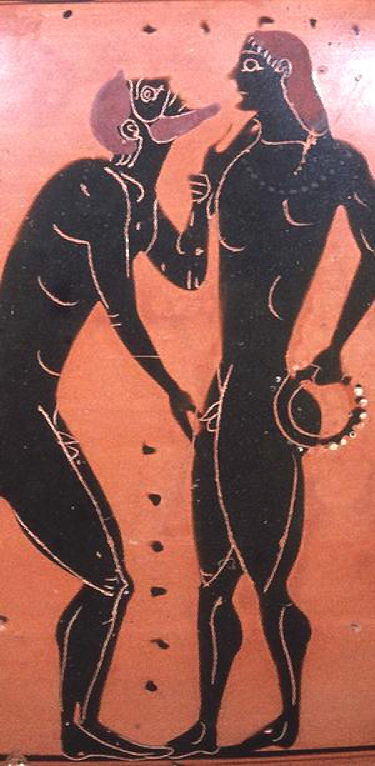
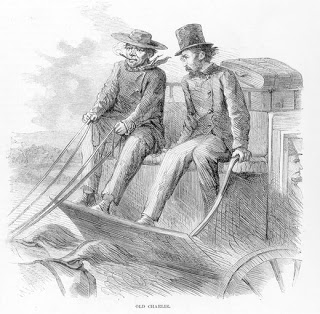
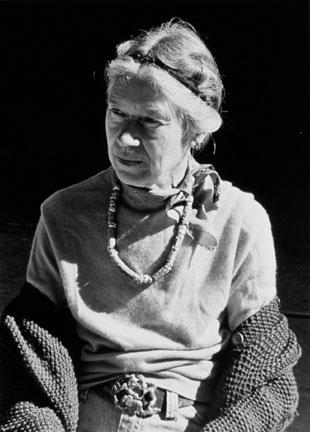
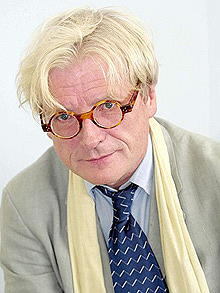
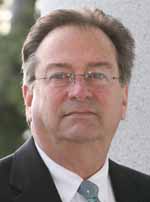
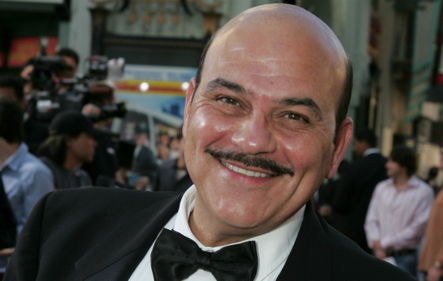

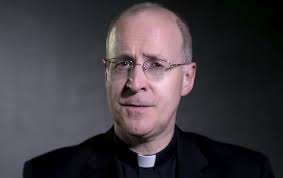
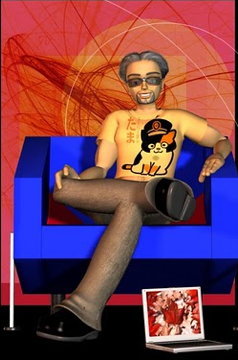 Self-portrait
Self-portrait